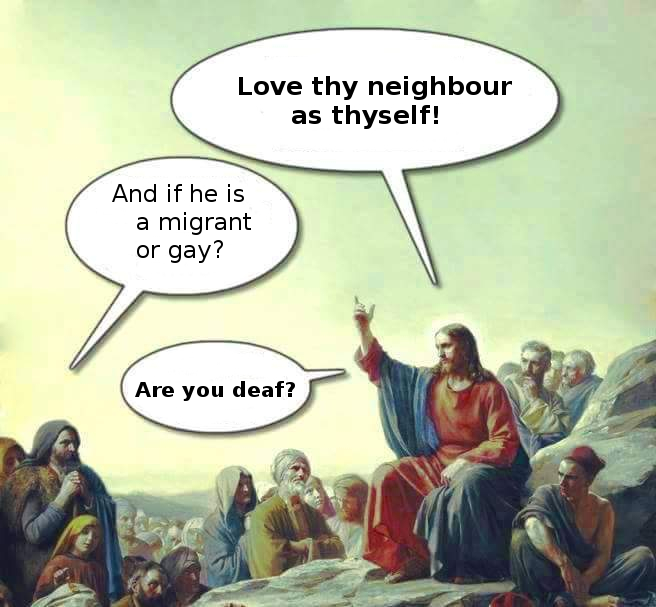Concerning Jealousy
“You and your ubiquitous jealousy…!”, we hear, “You’re victim to your complexes!”
And anyway, those are: “Outmoded bourgeois resentments…“, – and with an ironic wink often the quotation* is added „In jealousy there is more self-love than love.“
But even in circles of supposedly empathic and well-informed ethical multiple relationships, “good advice” is dealt out quickly: “I think, you’d better work on your jealousy (= so that the rest of us can continue unmolested as before!)”. Or the knockout argument of all kitchen table psychology is put into the field: “The problem should be left to the person who has the problem (= so that the rest of the relationship-network can continue unmolested as before).”
Ouch!
That’s hardly non-violent, mostly inaccurate, and the remaining bits of truth contained in it are so distorted that in such a case they will hardly help. But what’s certainly clear is that jealousy is an issue where emotions and feelings quickly escalate on all sides – and where it is therefore not so easy to blaze a path through the matted jungle of hasty diagnoses and categorical blame.

Take a deep breath.
According to my life’s experience so far, there is no “jealousy” per se. Jealousy is as individual and different as the people who are plagued by it. Plagued by it, I say, since – also according to my experience – I have never met a single person who is gladly and willingly jealous. And unfortunately, even with the latter reproach, those affected are also regularly confronted: jealous people would “instrumentalise” their jealousy with pleasure, to deliberately mess things up for all others involved.
Even a look at Wikipedia makes this unlikely:
“Jealousy generally refers to the thoughts or feelings of insecurity, fear, and concern over a relative lack of possessions. Jealousy can consist of one or more emotions such as anger, resentment, inadequacy, helplessness or disgust. Jealousy is a typical experience in human relationships, and it has been observed in infants as young as five months.”
At this point I already hear how the people, who feel restricted by a jealous person, prepare for a counter-attack: This definition would show that jealousy would be a mere “sensation” – that is, a purely subjective assessment. And anyway: It would be a pretty demanding claim to rely on other people regarding an adequate supply of “recognition, attention, love, peace and security” in such a fashion. The affected person clearly would be well advised to improve its self-esteem…
Take a deep breath.
I think that the Wikipedia-Entry on the subject is quite useful – but in my opinion it still falls short in a few important aspects. If you read through the rest of the article (as so many other contributions regarding the topic), then the descriptions there are rather focused on occurrences in the present. The article acknowledges: „These definitions of jealousy share two basic themes. First, all the definitions imply a triad composed of a jealous individual, a partner, and a perception of a third party or rival. Second, all the definitions describe jealousy as a reaction to a perceived threat to the relationship between two people, or a dyad. Jealous reactions typically involve aversive emotions and/or behaviors that are assumed to be protective for their attachment relationships. These themes form the essential meaning of jealousy in most scientific studies.“
If the circumstances would always be that simple, then in my opinion most cases of jealousy – at least in ethically-non-monogamous realms – shouldn’t become so often the threatening dramas that those involved usually experience. And even if we object that most of us have just arrived from the “old world of monogamy” with its elaborate rules of thinking in terms of “claim and possession”, there remains still a considerable amount of relational dynamite, which can not be defused just by a mere paradigm shift, as far as the relationship philosophy is concerned.
Why do I think that this is so?
First and foremost, it seems important to me to neatly separate the concepts of “cause” and “stimulus”, usually mingled in our thinking and speaking as “fault” (“It’s your fault that…!”). Therefore, the most part of the circumstances described in the Wikipedia-Entry, belongs in my estimation to the category of “stimulus”: People are in a relationship, a relationship-parameter changes (for example, by the addition of another person or a time-consuming hobby), this changes the relationship-symmetry, and a sensitive person now experiences deprivation and feelings of inferiority, accompanied by anger, sadness, fear and shame.
Of course it is therefore also a good idea to look at this “stimulus” as well: Does the change violate in any way the emotional contract, which belongs to the already existing relationship? For example, if all parties involved had agreed on a kind of ethical non-monogamy, such as Poly- or Oligoamory, and now there is the possible initiation of another relationship, then such a thing could be totally covered by the standing agreement, if not suddenly other arrangements (job, household, finances) are grossly neglected. Probably, however, the existing agreement “emotional contract” would at least have to be readjusted, as the resource “time” is not infinitely divisible and reproducible…
Alas, the frustration in non-monogamous relationships with regard to jealousy exists mostly, because even after all such reasoning, because in spite of all these good agreements and adjustments, jealousy can lunge out like an untamed tiger, though.
In my experience, jealousy is mainly a “phenomenon of causes” and not primarily a “phenomenon of stimuli “. Hence the good news first: Jealousy is most likely less causally related to the people interacting just now. Or rather “only” that much: What happens in the present is the repeatedly provoked trigger (psychologically called “stimulus”) for the underlying cause of the jealousy.
But this is where our good news comes to an end, for with this conception we are literally removing the lid from Pandora’s box, under which there exists an often frighteningly mingled situation in all of us:
Our brain is a truly great organ. Its storage capacity is legendary, as well as its economic efficency¹. In order to maintain its economic efficency (e.g. to ensure that we can absorb new knowledge on a daily basis, can drive a car without thinking too much, and efficiently carry out our day-to-day work with changing challenges), it processes and stores numerous impressions with a simplifying “data-chunk procedure” (in the form of compressed information-chunks), so that the sheer number of incoming information and sensory impressions may not incapacitate us. This “information-chunk-procedure” starts with the development of the brain before we are born and is active throughout our lives. The “secret” of this chunk-processing is an important part of our brain’s memory called “the unconscious” (or the subconcious), which is able to pick up, store and allocate large amounts of information as needed. During our socialisation, the “unconscious” also serves to absorb all the emotions and feelings that – for some reason – we can not or do not want to deal with immediately. The latter, however, is not always a good thing, because in this way over a longer period of suffering a phenomenon builds up, which is psychologically referred to as “complex“, because the brain – economically efficient as it is – usually files similar experience, so to speak, in a common bundle. Or as the psychiatrist C.G. Jung once said: “internalised, generalised conflictual experiences that are emotionally conspicuous and linked to a particular relationship issue“.
Concerning that the psychologist Verena Kast explains²: “If topics or emotions associated with the complex are addressed, then the whole of the unconscious linking is activated, along with the associated emotions from the entire life as well as the resulting stereotyped defense strategies. In such a situation you can no longer control the emotions, you can not think calmly about a situation, you have an ’emotional rupture’. “
At this point it can already be seen that “trigger” and “cause” are linked in that way. Jealousy is almost always a “resentment “.
Again Verena Kast: “The word resentment comes from French re-sentir ‘to feel sth. again’. It is about the repeated experiencing and re-experiencing of certain relationship occurrences. E.g. again and again one remembers how one has been treated unfairly, how one had no opportunity to defend oneself successfully. […] Here the impotence of action, which has led to a development of resentment, is clearly visible. People feel exposed, trapped, defenceless. In other words, they have a loss of self-efficacy, an important aspect of self-esteem, and this corresponds to episodes of complexes which deal with humiliation and violation of self-esteem.”
The anthropologist Max Scheler called this “psychic self-poisoning“, because these resentments were once based on normal human emotions and basic emotions that could not be expressed at the right time and now – when triggered – erupt with violence and drama.
Which means: Our jealous persons, yes, they are now actually feeling anger, sadness, fear and shame with a life-threatening violence, as if the events that had once occurred would have happened just yesterday, but today they feel them as if they were connected to the triggering event – for example in Non-monogamy, when additional potential loved ones are appearing.
The issue that those affected should “work” on their problem – as the well-intentioned advice likes to call it – is challenged by two main problems:
On the one hand, there is the bygone time, which usually makes it no longer possible to clarify the inhibited experiences with those who were truly concerned at the time in a satisfactory and beneficial way. Nevertheless, perhaps one could consciously reflect upon those past occurences for oneself today (if the “causal participants” are no longer available); since now we are grown-up and have a broader view on past events – this clue is also contained in numerous guidebooks.
But on the other hand there is our brain itself, which sets up its own obstacles because of its mentioned working strategies. The science author Stefan Klein describes in his book “The Formula of Luck” ³ how the brain strengthens neural pathways (= data highways!) which are used frequently, and how it reduces those that are seldom deployed. When thinking in resentments and complexes, this has a disastrous effect. Klein writes: “Once we’ve started perceiving the world through darkened glasses, the brain is trying to maintain that negative mood: It picks stimuli that fit the emotional situation. Gloomy thoughts, negative experiences, and bitter memories are given priority access to consciousness. That way one sees misery everywhere, and the whole organism reacts accordingly. This works, as if the cerebrum thinks an abstract negative thought and manages to convince the rest of the brain that it is as real as a physical stressor (e.g. a real attack). In such a state of depression, this survival function is directed against ourselves. […] Accordingly, we delve into every detail of what might occur, dealing with concerns and possibilities that are unlikely to ever happen. But even the thought of it pulls our mood down; a price that we all pay for our imagination and intelligence.”
By which Stefan Klein also classified the great archetype of all jealous beings, the gloomy Othello from the eponymous drama.
What can be done?
“Such a ‘one-way street in your mind’, which was created during your growing-up, and which has been strengthened and reinforced by ‘re-experiencing events’ over a long time – and now it’s a four-lane highway – you will never get completely dismantled...” said a friendly psychologist in this regard to me. “But,” she said, “with the same mechanism that the brain has used to build that path of thought, you can strengthen another path today to counter that thinking with something equal or superior.” Thereby virtually creating a new highway of your own, which would then require a most confident and courageous mental leap in order to guide the ways of thinking back to painless realms (see below).
But this requires courageous commitment, and I would like to briefly sketch here – at the end of my article – four basic requirements, which in view of my oligoamorous experience are indispensable to it:
- Initially, the jealous person must have the opportunity to feel and express the totality of their feelings free of shame. In order to succeed, s*he must be granted that freedom by everyone else in the relationship network – and of course s*he has to first empower her*himself (which, since this “way of thinking” is unusual, can be really difficult). Strategies like Brad Blanton’s “Radical Honesty” but also the “Radical Permission” according to Mike Hellwig can be useful approaches to doing so.
- All participants in a relationship-network must work actively together for a common good. Attitudes like “Get a grip…!” are completely counterproductive. The distinct decision of all parties concerning a committed and firm will to be together (Entry 33) should be highly evident and perceptible to everyone involved.
Since in Oligoamory, of course, all participants in the sense of the totality, which is “more than the sum of its parts”, ensure recognition, attention, love and respect in the overall relationship.
[By the way: A transparently stated “2.” will also prevent the jealous person from being considered a “boycotter” who “uses” the jealousy to ultimately prevent the overall relationship.
In particular, allocating “blame” (“Because of you, I can’t see X as often as I like…“) must be prevented as much as possible. After all, a jealous person already feels deeply guilty inside already – and feelings of guilt and shame will only lead deeper into an existing trauma.] - Under no circumstances choose the unpredictable tactic “Continue as before”! The jealous person otherwise has no chance to strengthen their “new pathway”. If the same triggering stimuli are repeated over and over again (such as spending intimacy / time with new loved ones), then only new cascades of resentment and complexes are initiated – and the already existing highway of bitter thoughts will grow.
For many multiple relationships this is the most difficult part in practice: Because it means “Hold your fire, slow down”. And for the newly unfolding connection, it means suspending newly discovered goodies (such as intimacy) until the new pathway is strong enough.
If the jealous person experiences complete, unrestrained assurance that they are trusted with all these tools to regain their competence, then that is far more helpful at the empathy level. - Paths “away from the highway“ are concerning the individuality of the afflicted person. Often these people have to learn to believe themselves, to trust themselves again. By succeeding in doing so, they can also change their perspective regarding the present occurrences with their current triggers (even if at the beginning it may only be possible for a short time). But that way there is a chance that a new idea, a different perspective may arise. And finally this idea can help to evaluate a (otherwise triggering) situation differently than before.
Warning: This is NOT to be confused with a positive mental attitude. Positive thinking, applied to jealousy, works like a superficial self-programming that is not fit to reach the causal nucleus of stored old complexes in an individual. The brain will register “positive thinking” in that case as a “distraction manoeuvrer” from the true underlying cause and in such cases tends to increase its distrust and caution for further self-protection!
* François, Duc de La Rochefoucauld, Maxims, 1665
¹ The currently most understandable explanations of the latest findings of the neurosciences regarding the capacities of our brain are to my opinion currently being provided by Prof. Gerald Hüther in his various publications and video contributions.
² Verena Kast: Wi(e)der Angst und Haß: Das Fremde als Herausforderung zur Entwicklung, Patmos Verlag, 2017
Recommended reading:
Verena Kast: Neid und Eifersucht: Die Herausforderung durch unangenehme Gefühle, Deutscher Taschenbuch-Verlag, 1998
³ Stefan Klein „Die Glücksformel – oder: Wie die guten Gefühle entstehen“, Fischer Verlag, 2014
Thanks to my nesting partner Kerstin, without whom the jealousy for me would have remained a nebulous and irritating stranger, and thanks to Thomas Wolter on Pixabay for the photo.




